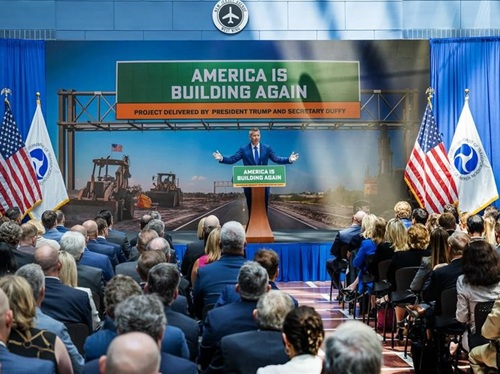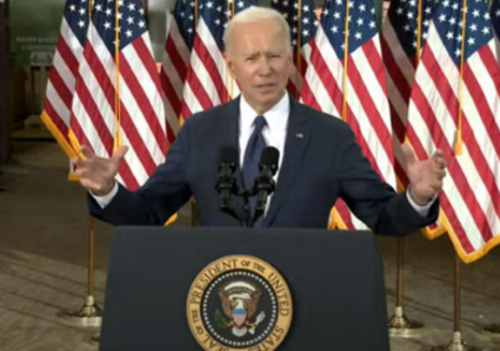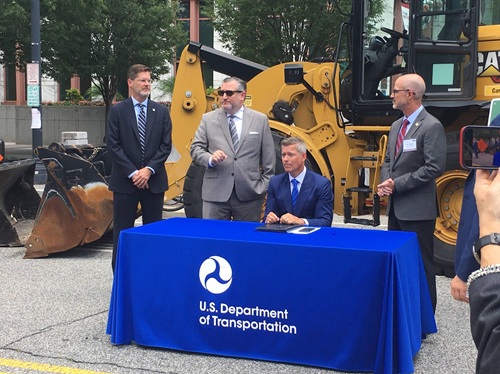The $2.3 trillion infrastructure investment package unveiled by the Biden Harris administration on March 31 – entitled the American Jobs Plan – allocates $621 billion in overall spending to the transportation sector, with the largest slice of that funding aimed at spurring major growth in the electric vehicle market.

“Is it big? Yes. Is it bold? Yes. But we can get it done,” President Joe Biden said during a press event in Pittsburgh. “The heart of the plan is modernizing transportation infrastructure – our roads, bridges and airports. It grows the economy in key ways. It makes it easier and more efficient to move goods, get to work, and become more competitive around the world. It will unlock traffic, reduce the bottlenecks at our ports and airports, keep people safe, and connect our cities, towns, and tribes across the country.”
The president described this plan as a “once in a generation investment in America, unlike anything we’ve ever seen or done since we built the Interstate highway system and the space race decades ago.”
The direct transportation spending proposed by the administration includes:
- $174 billion for retooling factories to make batteries and electric vehicles or EVs, along with consumer ‘point-of-sale’ rebates and tax incentives to buy American-made EVs. That money will also support grant and incentive programs for state and local governments and the private sector to build a national network of 500,000 EV chargers by 2030. It will also fund replacement of 50,000 diesel transit vehicles and electrify at least 20 percent of the nation’s school bus fleet.
- $115 billion for modernizing bridges, highways, roads, and main streets “that are in most critical need of repair.” That funding will go toward modernizing 20,000 miles of highways, roads, and main-streets, replace 10 of the most economically significant bridges in the country in need of reconstruction, and repair the worst 10,000 smaller bridges in the nation. The plan also focuses $20 billion to improve road safety for all users creating a Safe Streets for All program and funding “vision zero” plans.
- $85 billion to modernize existing transit and help agencies expand their systems to meet rider demand. The plan calls for doubling federal funding for public transit, spend down a $105 billion repair backlog – made up of over 24,000 buses, 5,000 rail cars, 200 stations, and thousands of miles of track, signals, and power systems in need of replacement – plus bring bus, bus rapid transit, and rail service to communities and neighborhoods across the country.
- $80 billion to address Amtrak’s repair backlog; modernize the high traffic Northeast Corridor; improve existing rail corridors and connect new city pairs; and enhance grant and loan programs that support passenger and freight rail safety, efficiency, and electrification.
- $25 billion in airport-related funding, including a new program to support terminal renovations and multimodal connections for affordable “car-free access” to air travel.
- $17 billion in inland waterways, coastal ports, land ports of entry, and ferries – considered “essential” to the nation’s freight system in the plan. That funding will also support a new “Healthy Ports” program to mitigate the cumulative impacts of air pollution on neighborhoods near ports, often communities of color.

The plan also includes billions for a host of “equity” initiatives in the transportation sector, such as $20 billion to fund a “new program” to “reconnect neighborhoods” cut off by past transportation investments, while ensuring any new transportation projects increase opportunity, advance racial equity and environmental justice, and promote affordable access.
Another $25 billion is being set aside in the plan to create a dedicated fund for “ambitious projects that have tangible benefits to the regional or national economy but are too large or complex for existing funding programs.”
The American Association of State Highway and Transportation Officials released a statement applauding the emphasis the Biden Harris administration placed on investing in infrastructure within the American Jobs Plan in order to shore up and modernize the nation’s multimodal transportation system for decades to come.

“Today’s announcement is a first step in a conversation about a generational investment in transportation infrastructure addressing climate change, resiliency, and equity that will support improved quality of life through innovative, safer and cleaner mobility options,” explained Jim Tymon, AASHTO’s executive director, in a statement. “America’s state DOTs look forward to playing a leading role with the Administration and Congress to achieve the objectives laid out in today’s plan.”
AASHTO also emphasized that it is “critical” that Congress and the administration work together in a bipartisan manner to reauthorize the federal surface transportation programs before the end of September when the current Fixing America’s Surface Transportation or FAST Act – extended for a year in late 2020 – expires.
The organization added that a long-term and robust reauthorization bill will provide state departments of transportation with the “predictability they need” to continue to improve the transportation network to provide greater access to opportunities for everyone including employment, education, health services, and recreation.

[Victoria Sheehan, commissioner of the New Hampshire Department of Transportation and AASHTO’s 2020-2021 president, emphasized the need for transportation funding predictability during a Senate Committee on Environment and Public Works hearing in February.]
The Biden Harris administration is also proposing to spend $100 billion on “proven workforce development programs” in its American Jobs Plan, targeted at underserved groups and getting our students on paths to careers before they graduate from high school. That includes $40 billion to support a new Dislocated Workers Program and sector-based training to help workers who lose jobs through no fault of their own gain new skills and to get career services they need with in-demand jobs.
It also includes $48 billion to support registered apprenticeships and pre-apprenticeships, while creating one to two million new registered apprenticeships slots. That funding would also go towards “strengthening the pipeline” for more women and people of color to access those opportunities through successful pre-apprenticeship programs.
Addressing equity in the transportation sector as well as workforce development issues are also key AASHTO priorities, as outlined in a resolution passed unanimously at its 2020 virtual annual meeting by the group’s board of directors pledging to address issues related to race, equity, diversity, and inclusion.
Other funding components of the administration’s plan include $111 billion for improving water infrastructure and replacing lead service lines; $100 billion for broadband internet investments; $100 billion to make the nation’s electrical grid more resilient and put the grid “on a path to achieving 100 percent carbon-free electricity by 2035.”
The plan also includes $180 billion to fund technology research and developments efforts at laboratories and universities across the nation.
However, to pay for all the one-time investments included in the $2.3 trillion American Jobs Plan, the administration is proposing to implement a total of $2 trillion worth of largely corporate tax increases over the next 15 years. Those tax increases include:
- Resetting the corporate tax rate to 28 percent and imposing a 15 percent minimum tax on the income corporations use to report their profits to investors, known as “book income.”
- Increasing the minimum tax on U.S. corporations to 21 percent and calculating it on a country-by-country basis so it hits profits in tax havens.
- Eliminate a rule that allows U.S. companies to pay zero taxes on the first 10 percent of return when they locate investments in foreign countries.
- Denying deductions to foreign corporations on payments that could allow them to strip profits out of the United States if based in a country that does not adopt a strong minimum tax.
- Disallowing corporations from writing off expenses that come from offshoring jobs.
Absent from the administration’s tax increase proposals are initiatives to keep the federal highway trust fund solvent by raising the motor fuel tax or implementing a vehicle miles travelled (VMT) fee.
In news stories prior to the plan’s introduction, U.S. Transportation Secretary Pete Buttigieg said neither would be included in the Americans Jobs Plan.
 Top Stories
Top Stories


